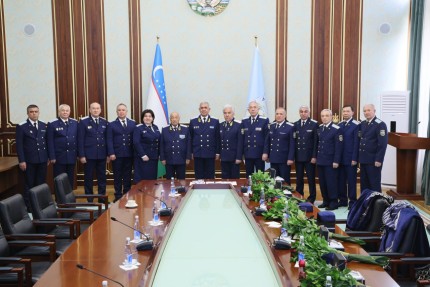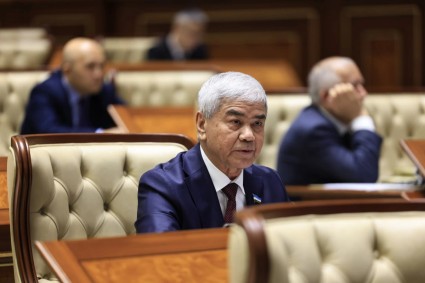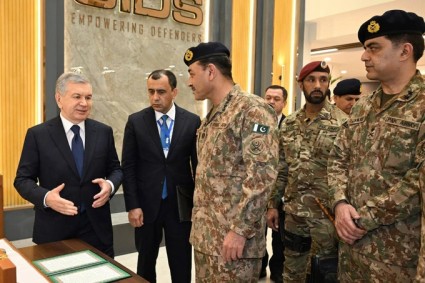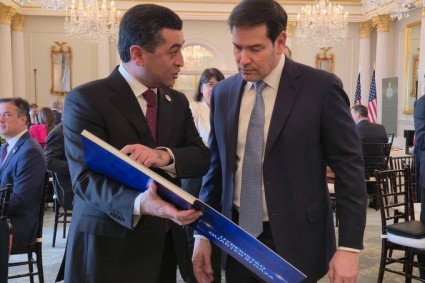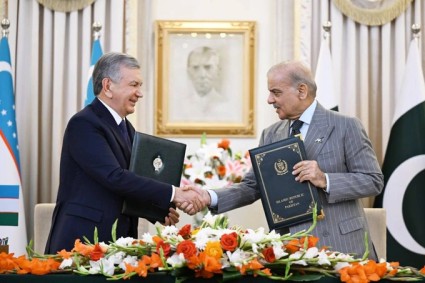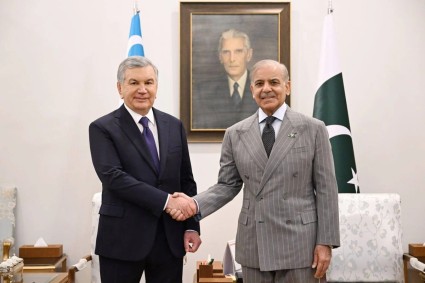On 15 February 2017, a new project “Strengthening Transport and Logistics Business Intermediary Organisations (BIOs) in Central Asia” was launched in Tashkent. The project is funded by the EU (750.000 EUR) and will be implemented in Uzbekistan and Turkmenistan in 2017-2019.
Ambassador Eduards Stiprais, Head of the EU Delegation to Uzbekistan, project team staff, representatives of partner organisations, entrepreneurs, diplomats and journalists attended the kick-off meeting.
The project will be implemented by CEED Bulgaria in partnership with the Chamber of Commerce and Industry of Uzbekistan (CCIU), the Association for Development of Business Logistics (ADBL Tashkent), the Latvian Association of stevedore companies (LSA) and the Turkmen Association of International Road Carriers (THADA).
The project's main objective is to support Uzbek and Turkmen BIOs and SMEs in developing of the logistic supply chain, storage and distribution of goods, jobs creation and staff training. In addition, the project will contribute to establishing institutional and legal mechanisms for public-private partnership through the institutional support of business associations working in the field of transport and warehouse logistics. It will help increase their competitiveness on domestic and foreign markets, stimulating SME growth and export expansion in the Central Asian states.
It's expected that the project will achieve a number of results. Namely, the project beneficiaries will increase innovative managerial expertise and upgraded business supporting competences of targeted BIOs to better serve the local transport and logistics business; will acquire fundamental managerial skills for running a successful business and gained practical experience from EU best entrepreneurial practices by SMEs; will increase export expertise of the BIOs and trade potential of SMEs; will build institutional partnerships between EU BIOs and assisted BIOs from Central Asia with the aim to promote sustainable transport and logistics practices.
At the kick-off meeting Ambassador Stiparis welcomed the meeting participants and spoke about the EU contribution to development of transport and logistics sector in Uzbekistan. An extract from his speech is given below.
"The European Union stands for development of economic relations, trade and transport communication with and between the –°entral Asia states to strengthen their independence and our bilateral and multilateral ties. For this end, since the beginning of 1990's we have been providing appropriate financial and technical support. Namely, in 1993, we started our cooperation in the area of transport, when TRACECA (Transport Corridor Europe-Caucasus-Asia) was established upon the signing of the Multilateral Agreement on International Transport for the development of transport initiatives between the EU Member States, the Caucasus and Central Asia states. The TRACECA programme has supported political and economic independence of these states through enhancing their access to European and global markets via road, rail and sea.
Uzbekistan, like other twelve TRACECA states, has benefited from the EU-supported programme participating in various project activities designed, among other things, to contribute to the long–term sustainable development of logistics infrastructure and multimodal transport along the TRACECA corridor, as well as support the further development of the transport system in the region and its interconnection to the major trans-European transport axes. We see the new project “Strengthening of Logistics and Transport Business Intermediary Organisations in Central Asia” launched today as the logical continuation of our joint efforts taken earlier under the TRACECA Programme.
Why this project is important for the EU and our Central Asian partners? The EU is one of the key leading trade partners for the five Central Asian nations. Namely, we were Uzbekistan's fourth and Turkmenistan's third largest trade partner in 2015 with total trade equal to EUR 1,978 mln and EUR 1,601 mln respectively.
Let's be frank, these figures are low, very low, taking into consideration that we speak about trade with a group of states, such as EU28. We understand that among the reasons behind this situation are also issues of transportation infrastructure and logistics services, which require further development both in Uzbekistan and Turkmenistan.
Nevertheless, we welcome efforts of the new leadership of Uzbekistan in this direction that set goals to remove the mentioned and other existing barriers for doing business and foreign investment in the country, including through the initiatives voiced under the Action Strategy for Development of Uzbekistan in Five Priority Areas in 2017-2021.
We believe the new EU-supported project will be in line with the Government of Uzbekistan's economic plans designed to speed up development of small and medium-sized enterprises (SMEs) in the country, and I'm sure, the same applicable to Turkmenistan too. As you are aware, SMEs are important for supporting economic growth including through provision of transport and logistics services that might become a significant contributor to GDP. SMEs play vıtal role for generatıng new employment opportunities and improvement of standards in certain sectors of the domestic economy.
We hope the given project will help reinforcing SMEs capacity in the mentioned areas through provision of better transport and logistics services with use of best European practice and know-how. This, in turn, will contribute to development of foreign trade including increased exchange in goods with the EU and other states. As a result, it will have a positive impact on growth of Uzbekistan and Turkmenistan's economies" – Ambassador Stiprais said.






